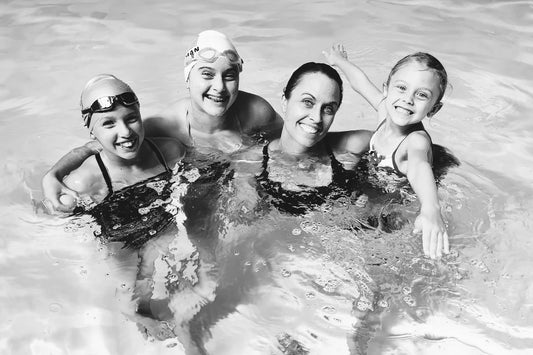Building your child's water confidence is key to ensuring they enjoy their time in the pool and develop the skills necessary to swim safely.
One of the most effective ways to achieve this is to make swimming a fun and interactive experience through games.
These games are entertaining and help your child build confidence in the pool by gradually easing them into the water.
They also teach fundamental swimming skills while improving your child’s comfort in water.
With that in mind, let’s explore how pool games can transform your child’s swimming journey and offer a fun yet educational approach.
Table of Contents
- How Games Help Children Build Swimming Confidence
- 10 Fun Water Games to Try with Your Child
- Treasure Hunt
- Pool Noodle Races
- Marco Polo
- Splash Tag
- Water Balloon Toss
- Underwater Charades
- Ring Dive
- Shark Attack
- Floating Obstacle Course
- Starfish Float
- Safety Tips for Playing Games in the Pool
- How to Encourage Timid Swimmers
- Conclusion
- Frequently Asked Questions
How Games Help Children Build Swimming Confidence
Activities that build confidence in water are crucial in transforming a child’s perception of swimming from intimidating to enjoyable.
Games allow children to learn about water in a safe, controlled, and fun manner, making it less about formal lessons and more about natural discovery through play.
Water games build a strong foundation for swimming skills for kids as they unknowingly practice essential techniques like kicking, paddling, floating, and breath control.
Additionally, introducing pool games for toddlers can be incredibly beneficial for helping them adjust to water early on.
As children progress, they also become more aware of the importance of pool safety tips.
Games provide an opportunity to practice these skills in a fun environment, from understanding how to stay afloat to knowing when and where it’s safe to swim.
The fun factor combined with learning can help your child build confidence in the pool, fostering a lifelong love for swimming.
Additionally, safety is an important factor in any sport. Their sense of confidence comes from a feeling of security. Here are the ways you can keep your child safe while swimming.
10 Fun Water Games to Try with Your Child
Here are 10 engaging and exciting water games to help your child build confidence in the pool while teaching them essential swimming skills:
1. Treasure Hunt
This game involves placing small toys or sinkable objects around the pool, which your child has to find and retrieve.
By diving down to collect the treasures, they improve their breath control and become more comfortable submerging.
This activity also helps reduce anxiety related to underwater swimming, making it a great game for reducing fear of water. Plus, it’s an excellent introduction to simple, fun swimming challenges.
2. Pool Noodle Races
In this game, children "ride" on pool noodles like they are riding horses and use their hands or feet to paddle across the pool.
It’s a fun way to build strength and balance while also improving coordination.
The light-hearted competition can encourage even the most timid swimmers to participate and improve water comfort for children. It's especially useful for kids who hesitate to swim without support.
3. Marco Polo
A timeless classic, Marco Polo is a great way for children to develop their swimming and listening skills.
The child who is "it" closes their eyes and tries to tag the others by calling out "Marco," while the others respond with "Polo."
It encourages spatial awareness, and the anticipation of being caught helps children get used to sudden movements in water, ultimately increasing their comfort and agility in the pool.
4. Splash Tag
In this version of tag, children try to splash one another rather than physically tag each other.
It’s perfect for pool safety for beginners since it keeps the game within shallow water and requires minimal swimming.
It’s also a good way to help your child build confidence in the pool by honing their reflexes, all while keeping it light-hearted and fun.
5. Water Balloon Toss
A simple yet fun game, children toss water balloons back and forth, working on their hand-eye coordination.
It’s ideal for toddlers or younger children who might be reluctant to fully immerse themselves in the water.
Through play, children begin associating water with fun, building their confidence at their own pace. This is a great way to learn swimming by playing games, where the focus is on enjoyment rather than pressure.
6. Underwater Charades
This creative game involves acting out different animals or actions underwater while the other players guess.
Not only does it encourage breath control and submersion, but it also helps build a sense of fun around swimming.
Children can also get creative, acting out different moves that require varying degrees of water immersion, helping them explore their comfort levels.
7. Ring Dive
Toss diving rings into the pool and have your child dive down to retrieve them.
It’s a simple game, but it teaches essential swimming skills for kids, such as holding their breath, swimming underwater, and getting used to opening their eyes beneath the surface.
Adjusting the depth of the rings allows this activity to be modified for different skill levels, ensuring that all children can participate regardless of their ability.
8. Shark Attack
In this imaginative game, one child is the "shark," and the others are "fish."
The goal is for the shark to catch the fish by swimming after them. This fast-paced game keeps children moving, which helps them burn off energy while improving swimming stamina and speed.
It’s also a good introduction to more dynamic water play and can help your child build confidence in the pool.
9. Floating Obstacle Course
Set up a floating course with various pool toys, and have your child navigate their way through it without touching the bottom of the pool.
This game builds coordination, balance, and endurance, helping to reinforce kid-friendly pool exercises that support their swimming development.
It’s a fun challenge that keeps kids engaged while practising essential water skills.
10. Starfish Float
Encourage your child to float on their back like a starfish. It’s a fundamental swimming skill that teaches them to relax and trust the water’s buoyancy.
Mastering this helps children feel safe in the water and is an essential step in boosting confidence in the pool.
Once your child can float with ease, they will have more confidence to try more advanced swimming techniques. Here’s a comprehensive guide on how to teach kids to swim safely.
Safety Tips for Playing Games in the Pool
While pool games are essential activities for building confidence in the water, safety must always come first. Here are some key pool safety tips to keep in mind when playing games with your child:
- Always supervise: Children should never be left unsupervised in the pool, even if they are confident swimmers
- Stay within reach: When playing games with toddlers or young children, ensure they are within arm’s reach at all times
- Teach pool rules: Before starting any game, remind your child of essential pool safety rules, like no running near the pool or diving in shallow areas
- Check the pool depth: Ensure that games involving diving are played in water that’s deep enough to prevent injuries
- Use flotation devices when needed: If your child is still building confidence, don’t hesitate to use flotation devices to help them feel more secure while playing
- Prevent ear infections: Ensure your child wears earplugs or uses ear sprays to prevent water from getting trapped in the ears, which can lead to infections such as swimmer’s ear
Additionally, this guide discusses everything you need to know to prevent ear infections in children during swimming.
By keeping safety in mind, you ensure that pool games remain a positive experience for your child as they continue to develop water safety skills as beginners.
Moreover, it is of utmost importance to equip yourself with the right gear for swimming safely. Here’s a complete list of essential gear for swimming safely.
How to Encourage Timid Swimmers
Not all children take to water naturally. For those who feel timid, start with small steps to help ease their anxiety.
Begin in shallow water where they can touch the bottom and introduce simple water confidence activities like kicking or splashing.
These non-threatening activities let them explore the water on their own terms.
Once they feel more comfortable, slowly incorporate kid-friendly pool exercises and games that build on their skills, like floating or reaching for toys just below the surface.
Celebrate small victories, such as when they can put their face in the water or float without help. Positive reinforcement goes a long way to help your child build confidence in the pool.
Use creative, playful approaches to reduce their fear gradually. A gentle, encouraging attitude and patience will help even the most hesitant swimmers become confident over time.
Here's our detailed guide on tips for overcoming a child's fear of water, providing strategies to help them feel comfortable and confident in aquatic environments.
Conclusion
Introducing children to water through fun and interactive games is one of the best ways to help your child build confidence in the pool.
These water games not only teach essential swimming skills but also foster a love for the water that can last a lifetime.
Remember to always prioritise safety, encourage timid swimmers with patience, and turn swimming into an exciting adventure.
Frequently Asked Questions
- How can I help my child gain confidence in the pool?
You can help your child build confidence in the pool by starting with simple, fun water activities that gradually get them used to the water.
Begin in shallow water where they can touch the bottom, and introduce games that encourage them to move around, float, and splash without fear.
Always use positive reinforcement, avoid pressuring them, and let them progress at their own pace. Using flotation devices for beginners can also provide an added sense of security.
- What are some fun water games for kids?
There are many fun water games for kids that make swimming enjoyable while helping them develop important skills.
Popular games include treasure hunts, pool noodle races, Marco Polo, splash tag, and water balloon toss.
Each of these games incorporates different aspects of swimming, such as breath control, balance, and agility, making them both entertaining and educational.
- How can I teach my child to swim through games?
Learning to swim through play is a great way to teach children swimming skills without making them feel like they are in a formal lesson.
Games like ring diving or underwater charades encourage them to practice breathing and moving through the water, while fun activities like starfish float or pool noodle races can help them learn to float and paddle.
The key is to focus on fun and gradually introduce more complex skills as they gain confidence.
- What age should kids start swimming lessons?
Children can start getting introduced to water activities as early as six months, but formal swimming lessons for kids usually begin around age four when they have better coordination and understanding of instructions.
However, every child is different, so gauging their comfort level and readiness for structured lessons is essential. Always ensure swimming lessons focus on safety, fun, and building water confidence.




